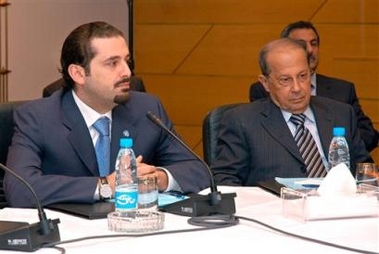 By Lin Noueihed , BEIRUT (Reuters) – Rival politicians resumed talks on Friday to end Lebanon’s political crisis but were unlikely to decide to dismiss the president or agree on the fate of Hizbollah’s weapons. The "national dialogue" conference, the first top-level political gathering since Lebanon’s 1975-1990 civil war, was adjourned on April 3 with a promise to lay to rest a dispute over whether Emile Lahoud should stay or go.
By Lin Noueihed , BEIRUT (Reuters) – Rival politicians resumed talks on Friday to end Lebanon’s political crisis but were unlikely to decide to dismiss the president or agree on the fate of Hizbollah’s weapons. The "national dialogue" conference, the first top-level political gathering since Lebanon’s 1975-1990 civil war, was adjourned on April 3 with a promise to lay to rest a dispute over whether Emile Lahoud should stay or go.
Lahoud has been under pressure to resign from politicians, who see him as the last vestige of Syrian tutelage that ended a year ago. The president, who has appeared relaxed and assertive on television in recent weeks, has so far refused to step down.
Parliament chooses the president in Lebanon, but political sources say that even the anti-Syrian bloc, which won a majority in the 128-seat house in May-June elections, has been unable to agree on its own preferred candidate let alone one that would be acceptable to other deputies. That being the case, the sources envision two scenarios.
Maronite former general Michel Aoun, who fought a battle with Syrians at the end of the war and returned from exile after they withdrew last year, could nominate himself for president and try to force rival politicians to back his bid.
That would put the onus on the anti-Syrian majority to either back Aoun or abandon their bid to unseat Lahoud.
Since his return, Aoun has fallen out with the main anti-Syrian bloc and aligned himself with the Shi’ite Muslim bloc of Amal and Hizbollah.
While they have reached an understanding with Aoun and have said they would not oppose his bid for the presidency, few believe the Shi’ite bloc would ultimately vote for him given his backing for a U.N. resolution demanding Hizbollah disarm.
If Aoun chooses not to nominate himself, the politicians will agree to disagree over the presidency, effectively leaving Lahoud in place, and move onto the last and most complex issue: what to do about Hizbollah’s weapons.
DIVISIVE ISSUE
Hizbollah, has refused to give up the arms it used to help end Israel’s 22-year occupation of southern Lebanon in 2000, but says it is keen to reach a negotiated deal on how best to defend the small country.
The future of Hizbollah’s arms is a deeply divisive issue in a country already fractured along sectarian lines. Some Lebanese believe Hizbollah should keep its guns as a deterrent to their powerful enemy Israel, while others say it is time the Shi’ite group laid down its guns and stuck to politics.
Political sources said the negotiators were unlikely to reach a decisive agreement on Hizbollah’s weapons, but would probably set up a committee of military and political experts to devise a strategy to defend Lebanon against Israel.
That would delay a final decision over Hizbollah, the only Lebanese group to keep its weapons after the civil war, while allowing politicians at the table to save face.



